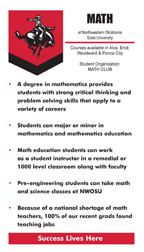
School of Arts & Sciences
Mathematics
The Mathematics program at Northwestern Oklahoma State University offers majors in Mathematics and Mathematics Education as well as a minor in Mathematics. Every student at Northwestern will take at least one course in the department in the form of general education courses, or other major required mathematics courses. Courses through Calculus II are taught each year, and we offer courses beyond on a two year rotation. We also offer a three course sequence specifically designed for future elementary school teachers.
Students pursuing Mathematics Education have the opportunity to work as a Student Instructor in a remedial or 1000 level classroom working directly with one of our faculty. Future teachers will get to work giving one-on-one help to students, preparing lessons and assessments and even teaching lessons during the semester. Many students studying Pre-Engineering also take courses in Mathematics and many pursue a minor as part of their degree plan. We also see many science majors choose to study mathematics as a minor field.
Math students at Northwestern can participate in Math Club, volunteer with outreach projects like BEST Robotics and the Math and Science Academy in the summers, or study in our designated study room or computer lab.
To learn more about how to become part of the Mathematics programs at Northwestern feel free to come see us on the second floor of Shockley Hall or email any of our dedicated faculty.
Contact:
Dr. Tim Maharry
Professor of Mathematics
Chair, Mathematics and Computer Science Department
Shockley Hall 214
Northwestern-Alva
(580) 327-8583
tjmaharry@nwosu.edu
Careers for Degree
What Can I Do with a Mathematics Degree?
|
|
Math Links
Mathematics Organizations
- Mathematics Association of America (MAA)
- National Council of Teachers of Mathematics (NCTM)
- American Mathematical Society (AMS)
- American Statistical Association (ASA)
- Association of Women in Mathematics (AWM)
Online Mathematics Journals
History of Mathematics/Other Math resources:
Math & Science Academy
NWOSU Summer Math & Science Academy
Sponsored by Northwestern Oklahoma State University thru the Beisel, Fellers, and Fisher Endowments
Friday mornings in June of Even Years
Student Center & Science Bldg, NWOSU-Alva campus
What is the Math & Science Academy?
-
Elementary students who have just completed grades 2 - 5 will engage in hands-on math and science activities with NWOSU faculty. The activities will be fun and engaging and designed to help build math & science skills. The program is FREE and is co-sponsored by the NWOSU Math & Science Departments through the Beisel, Fellers, and Fisher endowments. The Math & Science Academy is organized by Northwestern faculty members including Dr. Tim Maharry, Dr. Keenan Meeker, Dr. Jenny Sattler, Dr. Mary Riegel, and Dr. Nick Ledbetter and Dr. Jason Wickham.
How do I apply?
- Any student who has just completed grades 2 - 5 is eligible to apply. The first 50 applicants who have completed grades 2 - 5 by June 1 will be accepted. The registration deadline is at the end of May. The registration form should be sent to Dr. Tim Maharry, NWOSU Math Dept., 709 Oklahoma Blvd, Alva, OK 73717.
For more information contact Dr. Tim Maharry at (580) 327-8583 or tjmaharry@nwosu.edu .
Departmental Program Highlights
 A degree in mathematics provides students with strong critical thinking and problem solving skills that apply to a variety of careers
A degree in mathematics provides students with strong critical thinking and problem solving skills that apply to a variety of careers- Students can major or minor in mathematics and mathematics education
- Math education students can work
- as a student instructor in a remedial or 1000 level classroom along with faculty
- Pre-engineering students can take math and science classes at NWOSU
- Because of a national shortage of math teachers, 100% of our recent grads found teaching jobs
Student Learning Outcomes
Student Learning Outcome 1:
Students will apply the process of mathematical problem solving utilizing a variety of techniques.
Student Learning Outcome 2:
Students will construct and evaluate mathematical arguments and develop an appreciation for mathematical rigor and inquiry.
Student Learning Outcome 3:
Students will analyze relationships among quantities including functions, ways of representing mathematical relationships, and the analysis of change
Student Learning Outcome 4:
Students will utilize spatial visualization and geometric modeling to explore and analyze geometric shapes, structures, and their properties.
Student Learning Outcome 5:
Students will develop a conceptual understanding of limit, continuity, differentiation, and integration as well as a thorough background in techniques and application of calculus.